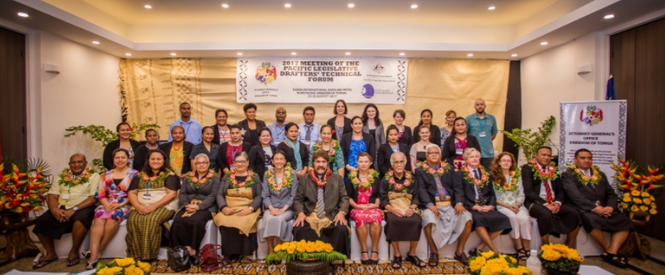
This August, the 2017 meeting of the Pacific Legislative Drafter’s Technical Forum, organized by the Pacific Island Forum Secretariat (PIFS), was held in Nuku’Alofa, Tonga. The Forum, hosted by the Attorney General’s Office of Tonga, brought together legislative drafters from 16 Pacific countries, as well as the IFRC Disaster Law Programme, the Commonwealth Secretariat, and PIFS.
Ms. Loretta Teueli, Assistant Attorney-General for Samoa, was interviewed during the Forum, about the disaster law process that have taken place and how the Samoan authorities are working with the Samoa Red Cross and IFRC in this important area. She had several insights to share, as outlined in the interview below.
How has the Samoa Government been working with Red Cross regarding disaster-related legislation, policies and procedures?
The most recent activity that Samoa has undertaken with Red Cross is a comprehensive review, undertaken by a local consultant, of our current laws to check compliance with international and regional commitments related to disaster risk management. Regarding disaster-related policy, Samoa Red Cross is a member of the Disaster Advisory Committee together with the Attorney-General of Samoa, where policies relating to disaster management are discussed and developed.
What are the priorities for Samoa and the Pacific in terms of legal frameworks for disaster risk management and climate change?
Samoa has decided to review its existing Red Cross legislation as there are substantial updates required to better reflect the role of the Samoa Red Cross. Samoa is also looking to re-write its disaster risk management legislation and has been fortunate to receive ongoing advice relating to areas of improvement from the Red Cross.
Why are disaster laws important?
Samoa appreciates the importance of disaster laws, to ensure stability during disaster and also the protection of the rights of individuals especially vulnerable groups including women and children.
More on the Forum:
The objective of the Forum was to undertake training in model legislation drafting, share experiences and challenges, and discuss progress against the goals of the 2015 – 2017 Regional Action Plan for Sustainable Legislative Drafting Capacity Building. It also provided a platform to identify and discuss new and ongoing opportunities for improving access to high quality legislative drafting services.
The IFRC’s Disaster Law Programme was asked to present at the Forum about its ongoing work in the Pacific, and the support it offers to National Societies in working with their public authorities to strengthen disaster-related legislation, policies and procedures to increase disaster resilience and ensure sustainable development in the Pacific.
The countries represented at the Forum that have worked with the Red Cross on disaster law, such as Tonga, Samoa and Vanuatu, highlighted the disaster law tools and resources which enable robust and quality research, as well as the ongoing support that was provided by Red Cross as part of their respective disaster risk management law reviews.
The Forum was held at an opportune time, as states will soon be called to institutionalize and integrate the Framework for Resilient Development in the Pacific (FRDP) into their national legal and policy frameworks. Adopted at the 47th Pacific Islands Forum Leaders Meeting in September 2016, the FRDP will contribute to the implementation of global frameworks, including the Sendai framework, and emphasizes the importance of law and policy in disaster risk management. The IFRC Disaster Law Programme has provided ongoing support in the development of the FRDP and will continue to support Pacific Islands States in institutionalizing the Framework.